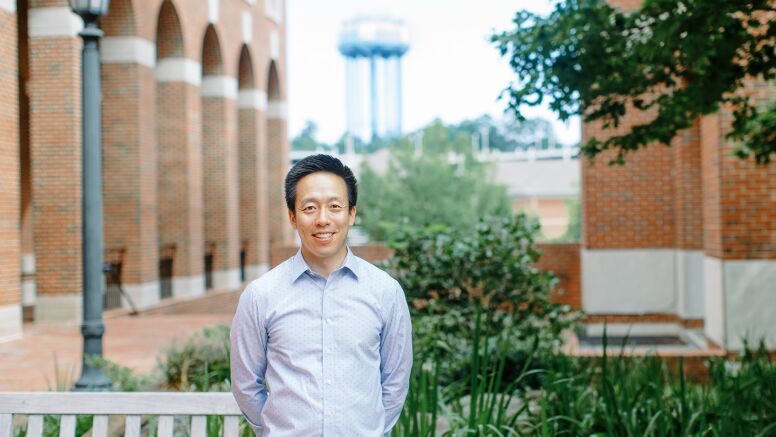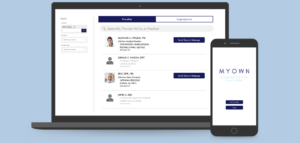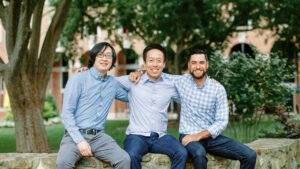News & Stories
Shifting from providing healthcare to solving its problems

Spending a decade working in U.S. healthcare made Chihao Tsui (MBA ’20) painfully aware of its inefficiencies. He set out to remedy some of the dysfunctions of the $3.6 trillion industry, enrolling in the full-time MBA program at UNC Kenan-Flagler, and founding a startup that harmonizes provider communication across the fragmented healthcare value chain.
The premise of his startup is simple: Streamline the care coordination drudgery facing front-line workers and you free up their time so they can get back to literally saving lives.
Tsui’s research uncovered that health workers spend more than half their time doing administrative tasks, and 46 minutes every day trying to communicate with other care team members.
“It’s frustrating for these professionals to spend valuable minutes of their day – waiting on hold, using fax and pagers and tracking down other clinicians – when they could be spending time with their patients,” he says. “These inefficiencies are a big burden on the system.”
 So, Tsui created MyOwn Communications, an open-source provider directory and integrated communication platform that expedites the secure transfer of clinical information between healthcare providers. He says to think of it as a HIPAA-compliant Slack pre-loaded with a provisioned directory of every healthcare provider and resource in the U.S.
So, Tsui created MyOwn Communications, an open-source provider directory and integrated communication platform that expedites the secure transfer of clinical information between healthcare providers. He says to think of it as a HIPAA-compliant Slack pre-loaded with a provisioned directory of every healthcare provider and resource in the U.S.
“U.S. healthcare is very siloed with a large disparity in resources between industry incumbents and smaller care delivery entities. Many healthcare professionals lack access to modern care delivery tools. Without the appropriate infrastructure, it is challenging to communicate and collaborate on patient care.” says Tsui. “Covid-19 has accentuated that problem: With people working from home it adds another layer of challenge to communication. But our network puts everyone in one place.”
 UNC Kenan-Flagler was the platform to launch his business, which he founded in March 2020 with classmates Richmond Rosati (MBA ’20) as chief marketing officer and Kevin Sun (MBA ’20) as chief technology officer.
UNC Kenan-Flagler was the platform to launch his business, which he founded in March 2020 with classmates Richmond Rosati (MBA ’20) as chief marketing officer and Kevin Sun (MBA ’20) as chief technology officer.
He created the business through Startup UNC, a year-long experiential learning class taught by Don Rose, Dave Neal, Randy Myer and Scott Albert to help students commercialize their ideas. Tsui learned how to build a business plan, create a prototype and pitch to investors.
Once the idea was fleshed out, MyOwn Communications entered the Launch Chapel Hill accelerator — a safe space to test ideas and receive feedback from likeminded entrepreneurs. Through this network, Tsui learned the importance of a “fail fast” mindset, a doctrine for extensive testing and incremental development to work out whether an idea has commercial value. “People are often so set on building their perfect vision without first testing with customers or potential investors,” says Tsui.
He drew on his experience as an orthopedic physician assistant at Tri-County Orthopedics in New Jersey. Run by Dr. Ken Montgomery, the head team physician for the New York Jets, the practice had robust demand but experienced challenges with accommodating acute injuries.
Tsui worked on several project to improve access, which culminated in the creation of a walk-in clinic for orthopedic emergencies. “I loved the greater impact of the clinic and decided to go to business school to further improve efficiency in healthcare,” he says.
He had family in North Carolina, and ultimately chose UNC Kenan-Flagler because of its extensive healthcare offerings.
“Other schools have a hodgepodge of healthcare classes, whereas UNC has a structured and robust healthcare program anchored in the Center for the Business of Health,” says Tsui. “It was a phenomenal experience to sit in a classroom with future physicians, public health experts and business leaders to discuss relevant healthcare issues. Students gain a unique perspective that facilitates a cross-functional approach to solving our greatest healthcare challenges.”
Experiential learning was a plus, too. In the STAR Program, he worked on a project with a healthcare startup that manages the inventory and delivery of vaccines. “It was eye opening for me,” he says. “You see how to make the world a better place and balance that with commercial sustainability.”
STAR also piqued his interest in healthcare consulting: He is joining Chartis, a boutique strategy house where he spent his summer internship.
 Extracurricular activities were another standout feature of his MBA experience. He joined a whole host of student clubs, from the MBA Healthcare Club, serving as vice president of diversity and student engagement, to the Asian Business Club, serving as executive vice president, to the basketball and flag football teams. He was part of a team that won first place in the 2018 UNC Deloitte Case Competition and on an interdisciplinary team that won first place in the 2019 E(I) Lab, an experiential program of the UNC Eshelman School of Pharmacy.
Extracurricular activities were another standout feature of his MBA experience. He joined a whole host of student clubs, from the MBA Healthcare Club, serving as vice president of diversity and student engagement, to the Asian Business Club, serving as executive vice president, to the basketball and flag football teams. He was part of a team that won first place in the 2018 UNC Deloitte Case Competition and on an interdisciplinary team that won first place in the 2019 E(I) Lab, an experiential program of the UNC Eshelman School of Pharmacy.
All the while, he also worked part-time as a PA at UNC Health Care.
Through his experiences Tsui learned how a diversity of perspectives leads to more creative ideas and better decisions. “I’m a little bit older compared to the typical MBA student. For me it was a great way to meet younger classmates and understand the millennial mindset,” he says. “It’s refreshing to see how they continually strive to innovate and challenge the status quo.”
He achieved his careers goals at UNC Kenan-Flagler. “I came to UNC Kenan-Flagler to develop a deeper understanding of the business of healthcare,” says Tsui. “I also built a stronger set of leadership abilities and learned the foundational tools to scale a successful healthcare startup.”
His ultimate ambition is to address the many challenges healthcare workers face on a daily basis, which should go a long way to improving patient care, too. As he works in healthcare consulting at Chartis, he will continue building his startup while looking for new opportunities to improve our current system.
Or is it the other way around?
“I expect mutual alignment between both organizations,” he says. “At the end of the day I’m driven to find better ways to improve care delivery. It’s all about improving patient care.”